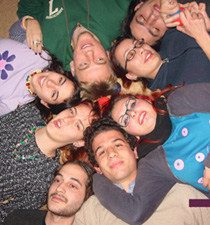|


|
 |
|
|
|
| Consciousness raising, self-education and political responsibility |
|
| As the credibility of the technocrats is increasingly questioned, modern environmentalism is seeking for more participatory democracy, consciousness raising, self-education and political responsibility. The role of Universities in addressing the challenges is immense as education plays a vital role in providing knowledge and skills to pursue research that is either ecocentric or technocentric and in transmitting knowledge to the public. Scientists are not only training new scientists but they influence generations of environmental |
| writers and help in shaping public opinion and environmental consciousness by published work and announcements in congresses and workshops. Until recently, as Hardin said, man was locked into a system that compelled him to increase his use of the 'commons' (common property resources) without limit, in a world that is limited.19 Scientists are struggling to reverse this attitude and several recent initiatives launched have been recognised. |
Togetherness...
 |
An example of this scientific progress is life cycle assessment (LCA), 20 a 'cradle to grave' approach for assessing industrial systems which calculates the direct and indirect effects of processes and products use. LCA assesses any type of industrial application or process from the state at which raw material is extracted until all material has been returned back to earth as waste or recycled for other types of use and estimates the cumulative environmental impacts from each and every stage including material acquisition, transportation, manufacturing, use, maintenance, reuse, recycling and waste management.
However LCA has just recently been included in environmental impact methodologies (i.e. Breeam schemes with assessors far from comfortable on assessing relevant scheme sections' requirements). Public majority is still clueless regarding such concepts and so who is to exercise pressure on governments and other authorities directly or indirectly?
David McKay wrote a wonderful book in a very readable and entertaining style spiced with humour, addressed to anyone wanting to be an informed citizen, from the expert to the layman, the private sector decision maker, the practical people seeking to understand what is important in energy and what not. The author, tired of discussions about energy policies that don't include numbers, focuses on a key question: can we stop using fossil fuels, get our power from sustainable sources, and consume no more than we produce? 'Can we conceivably live sustainably?'21 In the first section, he deals with either an element of energy consumption, or a method of power generation. Using known data and simple arithmetic, Mac Kay arrives, in a technocentric way, at numerical estimates of power usage and generation and concludes that we are not able to generate enough renewable energy unless reductions in demand and increases in supply are big. 'We must not be distracted by the myth that "every little helps", he says, if everyone does a little, we'll achieve only a little'.22 The second section, which explores opportunities and efficiencies to reduce our energy consumption, quantifies where and how much energy can be saved and shows us how to do it. MacKay also says that the price of carbon dioxide must be such that people stop burning coal without capture ("all coal power stations must use carbon capture"), he supports economists' suggestions for big carbon taxes and suggests that governments must legislate a huge tax on inefficient appliances; ban from sale all fridges that do not meet economy benchmarks; require all flats to meet high standards of insulation etc.
As to the non-readers, constituting the largest part of a population, the scientists' messages are communicated through the media or by word of mouth. For example, a person who is unaware of the impact on nearby waterways that over-fertilising city lawns has, would not take the waterways into consideration when making decisions about applying a fertiliser. When this knowledge is passed on, the ecocentric perhaps stops using fertilisers and the technocentric probably seeks for environment friendly solutions whenever there are any developed by the new technology. The result is the same - a more sustainable environment even if a perfect consensus of opinions is not achieved. | |
| Either we must relate our activities to ecological imperatives (so that input and output are more or less balanced), or we must develop an acceptable code of altruism and longsightedness to regulate our actions willingly in the wider community interests - or both, as many ecocentrists believe. 23 |
|
| |
|
|
|
|
|

|
|
